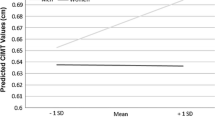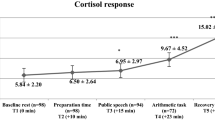Abstract
Purpose
Police work is a stressful occupation. Depressive symptoms, which may occur as a result of exposure to stressors in police work, have been known to be associated with an increased risk of cardiovascular disease. This cross-sectional study investigated the association between depressive symptoms and carotid artery intima-media thickness (CIMT) among police officers.
Methods
CIMT was measured with B-mode carotid ultrasonography. Depressive symptoms were measured using the Center for Epidemiological Studies Depression (CES-D) scale. Analyses of variance and covariance were utilized to examine the mean values of common CIMT (CCA IMT) and maximum CIMT (MMXIMT) across quintiles of depressive symptoms.
Results
Participants included 412 officers (mean age = 41 years). Hypertension status significantly modified the association between CES-D score and CIMT. The association between CES-D score and CCA IMT was statistically significant (adjusted P = 0.030) but only among officers without hypertension. The associations between CES-D score and MMXIMT were not significant among officers with or without hypertension. Our results also showed that among officers who reported poor sleep quality, mean levels of CCA IMT, and MMXIMT tended to increase as depressive symptoms increased.
Conclusions
Depressive symptoms may be therefore be independently associated with CIMT, yet masked by hypertension. Even though sleep quality did not significantly modify the main association, our results also suggest that poor sleep quality may act synergistically with depressive symptoms to increase CIMT. Future prospective work would help to clarify these associations.
Similar content being viewed by others
References
American Psychiatric Association (2000) Diagnostic and statistical manual of mental disorders, 4th edn. American Psychiatric Association, Washington, DC
Appels A, Mulder P (1988) Excess fatigue as a precursor of myocardial infarction. Eur Heart J 9:758–764
Barefoot JC, Schroll M (1996) Symptoms of depression, acute myocardial infarction, and total mortality in a community sample. Circulation 93:1976–1980
Berg AM, Hem E, Lau B, Haseth K, Ekeberg O (2005) Stress in the Norwegian police service. Occup Med 55:113–120
Bots ML, Evans GW, Riley WA, Grobbee DE (2003) Carotid intima-media thickness measurements in intervention studies: design options, progression rates, and sample size considerations: a point of view. Stroke 34:2985–2994
Bowman MA, Nicklin DE (1997) Family medicine new guide to clinical preventive services published by the US Preventive Services Task Force. Depression and other stressors associated with hypertension. JAMA 277:1857–1858
Buysse DJ, Reynolds CF III, Monk TH, Berman SR, Kupfer DJ (1989) The Pittsburgh sleep quality index: a new instrument for psychiatric practice and research. Psych Res 28:193–213
Chambless LE, Heiss G, Folsom AR, Rosamond W, Szklo M, Sharrett AR, Clegg LX (1997) Association of coronary heart disease incidence with carotid arterial wall thickness and major risk factors: the atherosclerosis risk in communities (ARIC) study, 1987–1993. Am J Epidemiol 146:483–494
Chambless LE, Folsom AR, Davis V, Sharrett R, Heiss G, Sorlie P, Szklo M, Howard G, Evans GW (2002) Risk factors for progression of common carotid atherosclerosis: the atherosclerosis risk in communities study, 1987–1998. Am J Epidemiol 155:38–47
Chen HC, Chou FH, Chen MC, Su SF, Wang SY, Feng WW, Chen PC, Lai JY, Chao SS, Yang SL, Tsai TC, Tsai KY, Lin KS, Lee CY, Wu HC (2006) A survey of quality of life and depression for police officers in Kaohsiung, Taiwan. Qual Life Res 15:925–932
Ferrieres J, Elias A, Ruidavets JB, Cantet C, Bongard V, Fauvel J, Boccalon H (1999) Carotid intima-media thickness and coronary heart disease risk factors in a low-risk population. J Hyper 17:743–748
Ford ES, Giles WH, Dietz WH (2002) Prevalence of the metabolic syndrome among US adults: findings from the third national health and nutrition examination survey. JAMA 287:356–359
Franke WD, Anderson DF (1994) Relationship between physical activity and risk factors for cardiovascular disease among law enforcement officers. J Occup Med 36:1127–1132
Franke WD, Collins SA, Hinz PN (1998) Cardiovascular disease morbidity in an Iowa law enforcement cohort, compared with the general Iowa population. J Occup Environ Med 40:441–444
Grobbee DE, Bots ML (1994) Carotid artery intima-media thickness as an indicator of generalized atherosclerosis. J Int Med 236:567–573
Grundy SM, Cleeman JI, Daniels SR, Donato KA, Eckel RH, Franklin BA, Gordon DJ, Krauss RM, Savage PJ, Smith SC Jr, Spertus JA, Costa F (2005) American Heart Association; National Heart, Lung, and Blood Institute. Diagnosis and management of the metabolic syndrome: an American Heart Association/National Heart, Lung, and Blood Institute Scientific Statement. Circulation 112:2735–2752
Haas DC, Davidson KW, Schwartz DJ, Riekmann N, Roman MJ, Pickering TG, Gerin W, Schartz JE (2005) Depressive symptoms are independently predictive of carotid atherosclerosis. Am J Cardiol 95:547–550
Howard GA, Sharrett R, Heiss G, Evans GW, Chambless LE, Riley WA, Burke GL (1993) Carotid artery intimal-medial thickness distribution in general populations as evaluated by B-mode ultrasound: ARIC investigators. Stroke 24:1297–1304
Jonas BS, Lando JF (2000) Negative affect as a prospective risk factor for hypertension. Psychosom Med 62:188–196
Jonas BS, Franks P, Ingram DD (1997) Are symptoms of anxiety and depression risk factors for hypertension? Arch Family Med 6:43–49
Joseph PN, Violanti JM, Donahue R, Andrew ME, Trevisan M, Burchfiel CM, Dorn J (2009) Police work and subclinical atherosclerosis. J Occup Environ Med 51:700–707
Julius S (1988) Transition from high cardiac output to elevated vascular resistance in hypertension. Am Heart J 116:600–606
Karlsson B, Knutsson A, Lindahl B (2001) Is there an association between shift work and having a metabolic syndrome? Results from a population based study of 27,485 people. Occup Environ Med 58:747–752
Knutson KL, Rathouz PJ, Yan LL, Liu K, Lauderdale DS (2006) Stability of the Pittsburgh sleep quality index and the Epworth sleepiness questionnaires over 1 year in early middle-aged adults: the CARDIA study. Sleep 29:1503–1506
Kop N, Euwema MC (2001) Occupational stress and the use of force by Dutch police officers. Crim Just Beh 28:631–652
Lasfargues G, Sylvanie V, Caces B (1996) Relations among night work, dietary habits, biological measures, and health status. Intl J Behav Med 1996(3):123–134
Lorenz MW, Markus HS, Bots ML, Rosvall M, Sitzer M (2007) Prediction of clinical cardiovascular events with carotid intima-media thickness: a systematic review and meta-analysis. Circulation 115:459–467
Musselman DL, Evans DL, Nemeroff CB (1998a) The relationship of depression to cardiovascular disease. Arch Gen Psychiatry 55:580–592
Musselman DL, Knight BT, Baron A, Nemeroff CB (1998b) Further studies on altered platelet reactivity in major depression. In: Presented at society of biological psychiatry annual meeting, May 27–31, Toronto, Canada
Nagaya T, Yoshida H, Takahashi H, Kawai M (2002) Markers of insulin resistance in day and shift workers aged 30–59 years. Int Arch Occup Environ Health 75:562–568
Patterson GT (2003) Examining the effects of coping and social support on work and life stress among police officers. J Crim Just 31:215–226
Pizzi C, Manzoli L, Mancini S, Bedetti G, Fontana F, Costa GM (2010) Autonomic nervous system, inflammation and preclinical carotid atherosclerosis in depressed subjects with coronary risk factors. Atherosclerosis 212:292–298
Price CS, Pollock ML, Gettman LR, Kent DA (1978) Physical fitness programs for law enforcement officers: a manual for police administrators. US Department of Justice, Washington, DC
Radloff LS (1977) The CES-D scale: a self-report depression scale for research in the general population. Appl Psychol Meas 1:385–401
Rice SC, Zonderman AB, Metter EJ, Najjoar SS, Waldstein SR (2009) Absence of relation between depressive symptoms and carotid intimal medial thickness in the Blatomire Longitudinal study of aging. Psychosom Med 71:70–76
Riley WA (2002) Carotid intima-media thickness: risk assessment and scanning protocol. Eur Heart J 23:916–918
Sallis JF, Haskell WL, Fortmann SP, Wood PD, Vranizan KM (1986) Moderate-intensity physical activity and cardiovascular risk factors: the Stanford five-city project. Prev Med 15:561–568
SAS Institute Inc (2008) SAS/STAT® 9.2 User’s Guide
Spielberger C, Grier K, Greenfield G (1982) Major dimensions of stress in law enforcement. Florida Fraternal Order Police J Spring 6:10–20
Steinhardt M, Greehow L, Stewart (1991) The relationship of physical activity and cardiovascular fitness to absenteeism and medical care claims among law enforcement officers. Am J Health Prom 5:455–460
Stewart JC, Janicki DL, Muldoon MF, Sutoon-Tyrell K, Kamarck TW (2007) Negative emotions and 3-year progression of subclinical atherosclerosis. Arch Gen Psychiatry 64:225–233
Veith RC, Lewis N, Linares OA, Barnes RF, Raskind MA, Villacres EC, Murburg MM, Ashleigh A, Castillo S, Peskind ER, Pascualy M, Halter JB (1994) Sympathetic nervous system activity in major depression: basal and desipramine-induced alterations in plasma norepinephrine kinetics. Arch Gen Psychiatry 51:411–422
Violanti JM, Aron F (1994) Ranking police stressors. Psychol Rep 75:824–826
Violanti JM, Vena JE, Petralia S (1998) Mortality of a police cohort: 1950–1990. Am J Ind Med 33:366–373
Violanti JM, Vena JE, Burchfiel CM, Sharp DS, Miller DB, Andrew ME, Dorn J, Wende-Wactaski J, Beighley CM, Pierino K, Joseph PN, Trevesan M (2006) The Buffalo Cardio-metabolic occupational police stress (BCOPS) pilot study: design, methods, and measurement. Ann Epidemiol 16:48–156
Violanti JM, Burchfiel CM, Hartley TA, Mnatsakanova A, Fekedulegn D, Andrew ME, Charles LE, Vila BJ (2009) Atypical work hours and metabolic syndrome among police officers
Waked EG, Jutai JW (1990) Baseline and reactivity measures of blood pressure and negative affect in borderline hypertension. Physiol Beh 47:265–271
Wang Z, Inslicht SS, Metzler TJ, Henn-Haase C, McCaslin SE, Tong H, Neylan TC, Marmer CR (2010) A prospective study of predictor of depression in police. Psychiatry Res 175:211–216
Whipple MO, Lewis TT, Sutton-Tyrell K, Matthews KA, Barinas-Mitchell E, Powell LH, Everson-Rose SA (2011) Hopelessness depressive symptoms, and carotid atherosclerosis in women: the study of women’s health across the nation (SWAN) heart study. Stroke 40:3166–3172
Williams C (1987) Peacetime combat treating and preventing delayed stress reactions in police officers, in Post-traumatic stress disorders: a handbook for clinicians. Edited by Williams T, Cincinnati, Ohio Disabled American Veterans
Wolk R, Somers VK (2007) Sleep and the metabolic syndrome. Exp Physiol 92:67–78
Acknowledgments
This work was supported by the National Institute for Occupational Safety and Health (NIOSH), contract no. 200-2003-01580. The findings and conclusions in this article are those of the authors and do not necessarily represent the views of the National Institute for Occupational Safety and Health.
Conflict of interest
The authors declare that they have no conflict of interest.
Author information
Authors and Affiliations
Corresponding author
Rights and permissions
About this article
Cite this article
Violanti, J.M., Charles, L.E., Gu, J.K. et al. Depressive symptoms and carotid artery intima-media thickness in police officers. Int Arch Occup Environ Health 86, 931–942 (2013). https://doi.org/10.1007/s00420-012-0829-6
Received:
Accepted:
Published:
Issue Date:
DOI: https://doi.org/10.1007/s00420-012-0829-6




